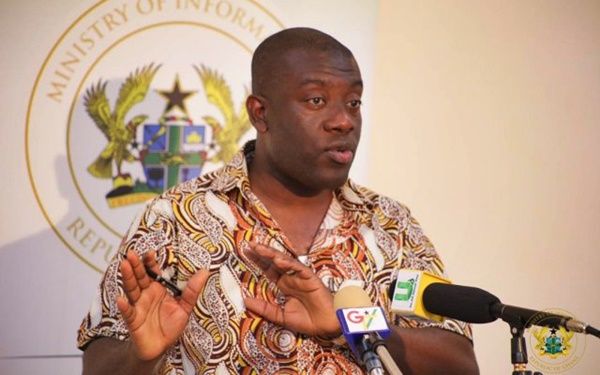Highlights, a year after the RTI law took effect in Ghana

It had been a long struggle to see the Right to Information Bill passed into law.
Advocacies, lobbying, petitions, protests which sometimes turned violent, were some of the activities which characterized the fight for the passage of the law.
After almost 2 decades, the law was enacted and given accent by President Akufo-Addo on May 21, 2019, but would only take effect the following year on January 2, 2020.
What that meant, according to the Minister for Information Kojo Oppong Nkrumah, on January 8, 2020, was that any citizen could walk into any public office and request for information using a standardized form in accordance with Section 18 of the Right to Information Act, 2019, Act 989. But that wasn’t the case in reality as checks by the MG news team at some government ministries including the Ministry of Finance and the Ministry of Trade and Industry in January showed they didn’t have any idea about the passage of the law and what it meant for them. There were neither designated officers for that purpose or standardized forms for the request of information.
The Ministry of Information would later assure the news team they would address those issues.
In the ensuing days, quite a number of issues would come up as regards the implementation of the RTI law which I capture in the succeeding paragraphs as highlights:
1. RTI law became effective on January 2, 2020: The Ministry of Information, the implementing agency for the RTI announcement in accordance with the ACT that the law had become effective and that citizens could request information from government ministries and agencies using standardized forms.
The Ministry simplified the request procure as contained in of ACT 989 for the public as follows;
2. Civil Society raised concerns about the implementation of RTI:
The media coalition for the RTI which had been very instrumental in the fight for the passage of the law felt sidelined in the implementation process.
The leadership of the coalition in an interview with Tv3 also raised issues regarding the absence of a board and a C.I to fully operationalize the ACT.
These concerns would persist for the most parts of 2020 until a board is set up 10 months later.
3. Ernest Henry Norgbey vs the Electoral Commission:
The real test of the RTI came to bear when the Member of Parliament for Ashaiman, Ernest Norgbey requested for some information from the Electoral Commission of Ghana (EC). The EC declined the request on the grounds that parliament had not prescribed fees under the Fees and Charges Act for the RTI. Aggrieved by the position of the EC, the MP filed a suit at the High Court alleging an infringement on his right to information under Article 21(1)(f). The court ruled in his favour and requested that he paid GHS 1500 for the information he requested.
4. MFWA vs NCA: The Media Foundation for West Africa (MFWA) under the RTI law applied to the National Communications Authority (NCA) for the list of all radio stations shut down by the authority and other pieces of information. The NCA said it would only give the information after the MFWA had paid a fee of GHS 2000 in accordance with the Electronic Communications Act. This, the MFWA did not taking lightly, describing the move by the NCA as deception, suppression of right and an act of bad faith.
5. Government explains why it took long to establish a board for the RTI commission: After some pressure from civil society and the media coalition on the RTI on why the government failed to set up the RTI board after 7 months of its implementation, the government explained the initial candidates nominated for the board were later found not to have qualified for the job. Technical Assistant and Head of Delivery Unit at the Office of the Minister for Information, Selasi Abode-Spencer, in a stakeholder webinar, explained the government did not initially know for instance that the chair of the commission was not supposed to hold an office of profit. According to him, the government had to search for other suitable candidates.
6. The C.I. ready to be laid before parliament: At same webinar where Selassie explained why the appointment of the RTI board members had delayed, he disclosed that the Constitutional Instrument (C.I) for the full operationalization of the RTI law was ready to be laid before parliament. The 7th Parliament of the 4th Republic stands dissolved on the midnight of January 6, 2021 and Ghanaians can only hope some magic is performed to see that C.I laid and passed. If not, we can only look forward to the 8th Parliament which commences on January 7, 2021.
7. The appointment of the RTI board: President Akufo-Addo on October 19, inaugurated the board of the RTI commission, 10 months after the law came into effect.
The 7- member board is chaired by Justice K.A. Ofori-Atta, a retired High Court Judge, Mrs Elizabeth Asare, Deputy Chairperson; Mr Yaw Sarpong Boateng, Executive Secretary, and Ms Victoria Suswawu.The rest are Dr Edith Dankwa, Nana Kwame Duah, and Mr David Oppon-Kusi.
Having entered the 2nd year of the implementation of the RTI law, expectations are that actions will be expedited to make-up for all the lost time in the previous years. The major things to anticipate will be the passage of the C.I. as well as the publication of information manuals by all government ministries and agencies as required by the law at the end of every year.
Source: 3 News





